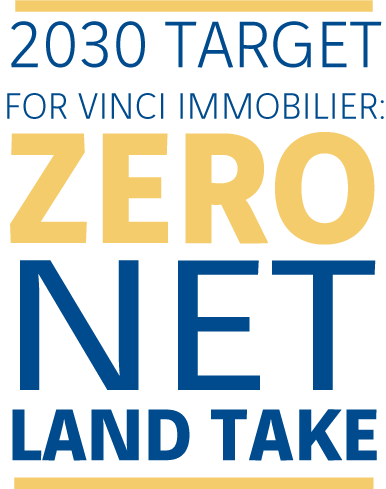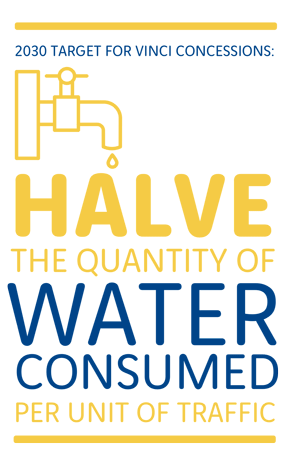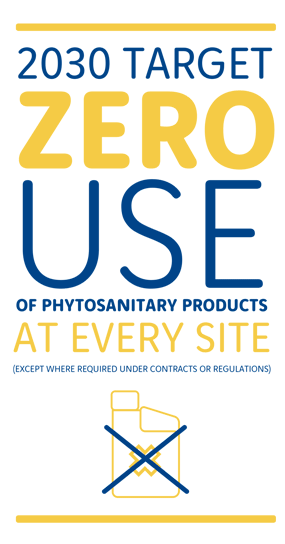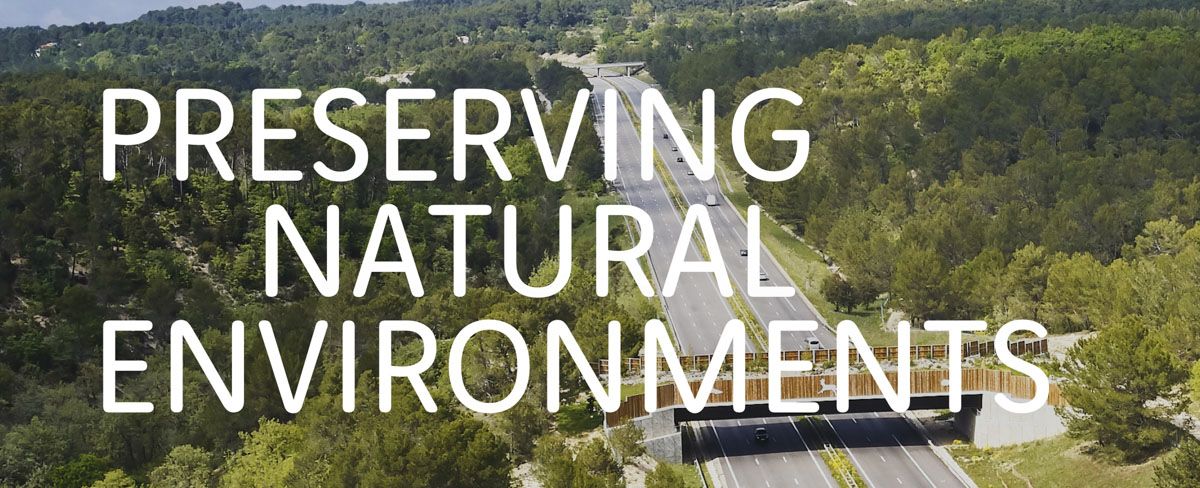
As natural environments are affected by the projects in which we are involved, we ensure our design, construction and operations processes focus heavily on protecting them. Throughout the project life cycle, the Group’s entities strive to have as little impact as possible on natural environments, as well as to develop solutions to conserve fresh water resources and restore ecological balance.
Adapting our activities to current and future ecological challenges
As natural environments are directly or indirectly affected by our operations, we ensure our design, construction and operations processes focus heavily on protecting them. Throughout the project life cycles, we strive to have as little impact as possible on natural environments. This means our activities must set an example, as well as provide and implement solutions that avoid, reduce and, where necessary, offset our impact.
VINCI innovates, develops and rolls out solutions that address environmental challenges, such as water management (water treatment plants and processes) as well as ecological restoration and transparency (reconfiguring stream and river channels, wildlife crossings, etc.).
We are very aware of how important these issues are and work with meticulous external local experts to offer appropriate and effective solutions on our projects. We are determined to expand these solutions and develop the expertise of our teams across the design, construction and operations phases, so we can offer ever-more targeted and robust solutions.
PROTECTING NATURAL ENVIRONMENTS
PLAYS A KEY ROLE IN OUR DESIGN, CONSTRUCTION AND OPERATIONS PROCESSES.
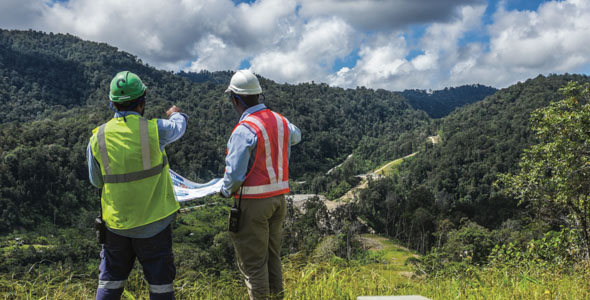
A strategy of continuous improvement
VINCI aims to reduce its impact on natural environments by aligning its businesses on long-term ecological challenges. The Group is accelerating the rollout of its ecological engineering expertise across all its businesses to ensure they consider biodiversity and natural environments in all their operations and projects of any size. Protecting natural environments requires in particular a considerable reduction in land take. As a national property developer, the Group, via its subsidiary VINCI Immobilier, demonstrates its intention to do its bit in this effort by going over and above regulatory requirements.
Governance, the sharing of best practices, and partnerships with ecological institutions and organisations are being improved to contribute to the Group’s progress. As part of some projects undertaken for their clients, its companies are also developing comprehensive ecological engineering solutions and alternative versions that are better for natural environments.

VINCI is committed to preserving water resources and aiming to achieve no net loss of biodiversity.
Achieve zero net land take by 2030
This commitment applies to all property development operations undertaken by VINCI Immobilier, both in the residential and commercial market.
As we understand urban development that relies on land take strategies is unacceptable from an environmental point of view, it is important to develop a new approach that harnesses land already taken, focusing primarily on urban recycling operations.
VINCI Immobilier will thereby become the first national property developer to achieve zero net land take, 20 years ahead of the 2050 target set by the French climate and environmental resilience law adopted in July 2021.
Aiming to achieve zero net loss of biodiversity
Initiatives are adapted to local environmental issues and the duration of the project on both worksites and long-term sites operated and managed by our companies.
VINCI is also one of the first companies to join the act4nature international alliance which aims to integrate the issue of biodiversity in all activities and at every level. It is committed to improving knowledge and disseminating best practices regarding the protection of biodiversity, training and raising awareness among employees, developing new solutions and strengthening partnerships.
Action taken
Achieve zero net land take
• For all VINCI Immobilier projects concerned, offset land take by reversing the process of equivalent surface area elsewhere in France.
Urban recycling
• Generate over 50% of VINCI Immobilier’s revenue through urban recycling projects by 2030.
• Urban recycling involves harnessing brownfield land and/or unused or obsolete buildings for new builds and renovations.
Prevent pollution and incidents by systematically implementing an environmental management plan in all our business lines
Rolling out local environmental management plans means defining environmental management indicators, setting up environmental governance and designating persons in charge of environmental management to assess and limit the impact of our activities on the flora and fauna of the region concerned.
We also develop business-specific awareness and training tools.
Actions taken
Zero use of phytosanitary products
• Employing alternatives to phytosanitary products, such as mechanical and thermal weed control and grazing animals.
Action plans, tools and measures
• Rolling out the biodiversity roadmap associated with the commitments to act4nature international.
• Employing an in-house strategy and tools to factor in biodiversity at the Group’s worksites and infrastructure.
Offsets and green works
• Developing nature-based solutions to fight climate change or flood risk, especially through ecological engineering.
• Voluntary or regulatory offsetting projects: based on the context, methods for measuring biodiversity losses and gains, and indicators to monitor change over time.

KEY FIGURES 2023
73% reduction in the consumption of phytosanitary products at concessions between 2018 and 2023.
49 airports within VINCI Airports use no phytosanitary products.
6% of soil-sealed land due to VINCI Immobilier operations in France in 2023.
€7.3 billion projects awarded environmental certifications and labels in 2023, the turnover achieved in 2023 within the framework of an environmental quality label, including €5.3 billion from external labels.
Commitments
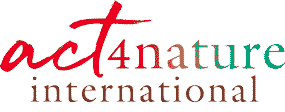
Infrastructure that preserves natural environments
PROTECTING BIODIVERSITY ON THE WESTERN STRASBOURG BYPASS
The western Strasbourg bypass project (24 km) included a biodiversity and natural habitat conservation programme of unprecedented scope, itself the result of three years of preparatory research. The motorway encourages ecological transparency with 130 structures, or the equivalent of about one wildlife crossing every 200 metres. Many of the crossings are traditional structures, such as the green bridges, viaducts and cut-and-cover tunnels. But others are more innovative, including the overpasses designed specifically for the European hamster, equipped with anti-predator systems, and the “bioducts” (crossings for small wildlife in the ledge along the gutter of road restoration works). The project also includes a breeding programme in conditions of partial freedom that will reintroduce 1,030 European hamsters into their natural habitat by 2023. The project itself involves a land area of 278 hectares, but the unprecedented ecological compensation measures cover 1,315 hectares, including 1,000 hectares where vegetation will be planted to create a favourable habitat for the European hamster. The land was earmarked for these measures before the works started and the measures will be implemented gradually as the work progresses.
RECONVERTING 50 BROWNFIELD SITES
In 2019, VINCI Immobilier partnered with Brownfields to acquire around 50 brownfield sites owned by Engie and located all throughout France. Some of this land used to be occupied by industrial facilities, including gas plants. In total, the land represents a total surface area of 358,000 m² that will be rehabilitated and reconverted into property and landscape developments. They will see nearly 2,300 homes (across 23 brownfield sites) being built by 2024. VINCI Immobilier is thereby helping to achieve the zero net land take target and inject fresh momentum into small towns.
UNIVERSEINE, THE FUTURE SUSTAINABLE NEIGHTBORHOOD AT THE HEART OF THE ATHLETES’ VILLAGE
Built in Saint-Denis, north of Paris, on former brownfield land spanning 6.4 hectares, Universeine was designed to accommodate the athletes competing in the many sporting events of 2024. The project is composed of four islands, 6,000 beds and 33,000 m² of service and commercial space. Fully reversible, these buildings will be converted in 2025 into housing and offices to create a new, modern, environmentally friendly and sustainable mixed-used development. Harnessing VINCI Immobilier’s expertise in urban recycling, the project was designed to meet the climate challenges of today and tomorrow.
The main concern was to minimise the carbon footprint of buildings, adapt to climate change and preserve biodiversity.
This comprehensive approach makes Universeine one of the first examples of a city of tomorrow that is sustainable and energy efficient.
RESTORING THE NATURAL ENVIRONMENT ALONG THE LGV SEA HIGH-SPEED RAILWAY LINE
The LISEA Biodiversity Foundation, created by the concession company of the South Europe Atlantic high-speed rail line (VINCI Concessions), provides long-term support to species conservation and restoration projects to protect natural habitats along the rail line in the French departments it passes through. Its actions supplement LISEA’s contractual commitments regarding environmental protection and come in addition to the regulatory compensation measures for 350 sites representing a total of 3,800 hectares. For example LISEA Biodiversity supports a programme by the French Bird Protection League (LPO) designed to save the European mink – the Charente basin is home to one of the continent’s last wild populations.
THE “AVOID, REDUCE, OFFSET” APPROACH ESTABLISHES THE PRINCIPLE OF “NO NET LOSS” OF BIODIVERSITY.
130
STRUCTURES ENABLE WILDLIFE TO CROSS THE WESTERN STRASBOURG BYPASS.
358,000
M2 OF BROWNFIELD LAND ACQUIRED BY VINCI IMMOBILIER FOR RECOVERSION PROJECTS.

Timber construction
Arbonis (VINCI Construction), which specialises in timber constructions – using wood with a positive carbon footprint sourced from sustainably managed forests – helps meet environmental performance objectives. The company designs and constructs all types of timber buildings and facilities, applying the latest technologies and methods. It is most notably taking part in the Treed It sustainable city demonstrator in Marne-la-Vallée, east of Paris, which includes the construction of an 11-floor, 37-metre-high tower with a wooden framework. It has also developed the modular ARBO 3D process, which boasts prefabricated elements, rapid on-site installation, great architectural flexibility and cost control, and is well-suited to the construction of buildings like schools and student accommodation.
37
A 37-METRE-HIGH TOWER WITH A WOODEN FRAMEWORK IN MARNE-LA-VALLÉE.
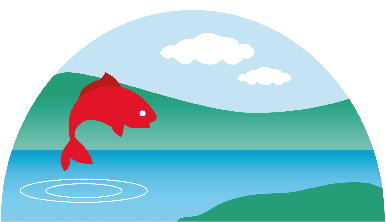
Restoring ecological connectivity
VINCI Construction applies its ecological engineering expertise to build structures designed to maintain or restore ecological connectivity, renaturalise natural habitats, and use and manage plant species. Equo Vivo, for example, is responsible for the hydromorphological restoration of the Yvette River in the Haute Vallée de Chevreuse Regional Natural Park. It is giving the river a more natural profile with new structures that also help hold back flood water.
80%
OF TIMBER USED BY WOOD CONSTRUCTION SUBSIDIARIES WAS FROM PEFC- OR FSC-CERTIFIED SUSTAINABLE FORESTS IN 2021.

Virtuous airports
VINCI Airports reduced the use of pesticides by 77% between 2018 and 2022 and is well on the way to eliminating the use of phytosanitary products in all its airports. It has also teamed up with the French national beekeepers’ association (Unaf) to protect and monitor pollinators. It also formed several other partnerships to protect biodiversity across its network. They most notably include ANA’s work in Portugal with CERVAS (Centre for Ecology, Recovery and Monitoring of Wildlife) and RIAS (Wild-life Rehabilitation and Research Centre of Ria Formosa) or in London Gatwick airport (Gatwick Greenspace Partnership and Sussex Biodiversity Records Centre) whose management of biodiversity was recognised by the Wildlife Trust’s Biodiversity Benchmark Award.

A partnership between VINCI Construction and PatriNat to create a national heritage centre of expertise and data
More recently, Grenoble Alpes Isère airport signed an agreement with the French Bird Protection League (LPO) so it could identify and highlight biodiversity issues related to its operations by regularly monitoring the bird species in its area.
Founded in 2012, the partnership between Eurovia (VINCI Construction) and Patrinat – a collaborative research and education entity focusing on natural heritage under the aegis of three organisations (the French Office for Biodiversity, the French Natural History Museum and the French National Centre for Scientific Research) – is pioneering for the industry and has helped expand scientific knowledge of biodiversity. It has:
• Developed scientific solutions and methods to assess the impacts of the company’s activities on biodiversity, such as the Ecological Quality Indicator (IQE) and a toolbox for assessing biodiversity around linear infrastructure (OEIL) used by planners and quarry operators.
• Centralised and analysed Eurovia’s existing data on flora and fauna to populate national databases.
• Implemented action plans to reduce the environmental footprint of quarries.
IN UGANDA, SOGEA-SATOM PLANTED 18,000 TREES IN 2019 ON A PLOT BELONGING TO UGANDA’S WATER AUTHORITIES.
A PARTNERSHIP BETWEEN EUROVIA AND PATRINAT TO PRESERVE BIODIVERSITY.

Optimising client water use
Axians (VINCI Energies) offers smart irrigation solutions. Using temperature and ground humidity sensors, as well as weather forecasts, Axians, helped the city of Florence in Italy reduce its water use by 30%.

Responsible management of public land around motorways under concession
VINCI Autoroutes cut its use of pesticides by 98% from 2018 to 2022. A total of 1,102 structures throughout its network enable wildlife to cross motorways and the VINCI Autoroutes Foundation plans to fund projects to protect biodiversity. It has also partnered up with the French Forest Office (ONF) to restore 200 sites (spanning 500 ha in total) between now and 2030.

